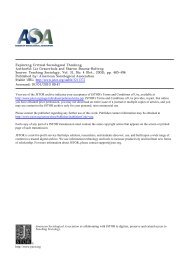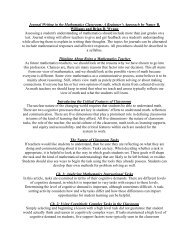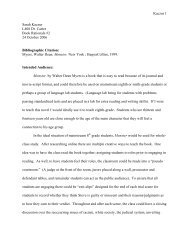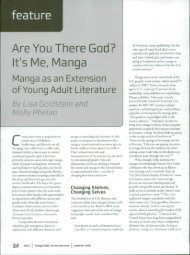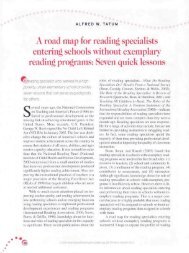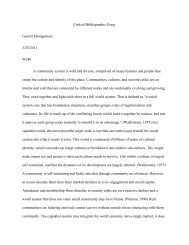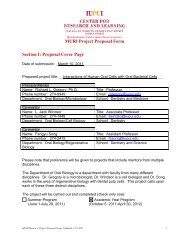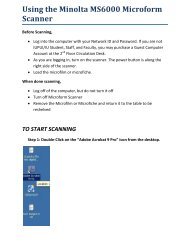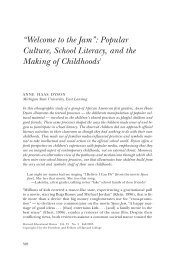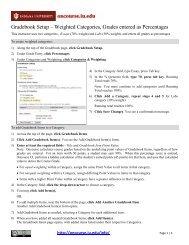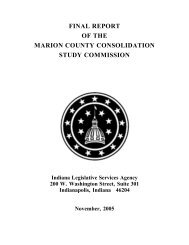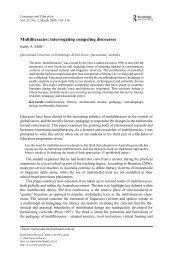Night. Night - Oncourse
Night. Night - Oncourse
Night. Night - Oncourse
Create successful ePaper yourself
Turn your PDF publications into a flip-book with our unique Google optimized e-Paper software.
Kaczur 14<br />
Grandfather<br />
Reb Dodye Feig<br />
Life for Wiesel and his extended family changed tragically in 1943 and 1944, when Nazi<br />
Germany decided that the Jews living in the Axis nations of Eastern Europe — Romania,<br />
Hungary, and Bulgaria — should share the fate of the rest of European Jewry and be<br />
transported to the death camps of Poland. Grandfather Dodye went first, when he and his<br />
three sons and their children where taken away in 1943. The following year, Wiesel's entire<br />
family, his mother, father and his three sisters, were transported with him to Poland. Only<br />
Wiesel and his two older sisters survived.<br />
Liberated from Auschwitz - Buchenwald by the American Third Army in 1945, he was sent to<br />
France to study as part of a group of Jewish children orphaned by the Holocaust. There he<br />
was given a choice — secular studies, or religious studies. Wiesel's faith had been severely<br />
wounded by his experiences in Auschwitz and three other concentration camps. He felt God had turned his<br />
back on the Jews. But, despite his bitterness, he chose to return to religious studies:<br />
"My only experience in the secular world," he explains, "was Auschwitz."<br />
Sent to Paris to study at the Sorbonne after several years of preparatory schools,<br />
he became a journalist for a small French newspaper, and supplemented his<br />
meager income as a translator and Hebrew teacher. Persuaded by the<br />
distinguished French Catholic writer Francois Mauriac, he finally put down on<br />
paper the experiences he had vowed to recount only after ten years of silence.<br />
The result was "<strong>Night</strong>", an internationally acclaimed memoir that has been<br />
translated into 30 languages and has sold more than seven million copies, the<br />
income from which goes to support a yeshiva in Israel established by Wiesel in<br />
memory of his father.<br />
Wiesel's entry card to Paris<br />
Wiesel has, since then, dedicated his life to ensuring that the murder of six million Jews would never be<br />
forgotten, and that other human beings would never be subjected to genocidal homicide.<br />
Most of the 40 books he has written since — novels, collections of essay, plays — explore the subject that<br />
haunts him, the events that he describes as "history's worst crime." Speaking, writing, traveling incessantly,<br />
he has become a spokesman for human rights wherever they are threatened — in the former Soviet Union,<br />
Rwanda, Bosnia, Kosovo — and with the Nobel Peace Prize award established the Elie Wiesel Foundation for<br />
Humanity.<br />
Assigned to New York in 1956 as a correspondent for an Israeli newspaper, Wiesel was struck by a taxi while<br />
crossing the street and was hospitalized for months. Still a stateless person at the time, unable to travel to<br />
France to renew his identity card and unable to receive a US visa without it, he found that he was eligible to<br />
become a legal resident. Five years later, he received an American passport, the first passport he had ever<br />
had. Years later, when his then close friend Francois Mitterand became President of France, he was offered<br />
French nationality.<br />
"Though I thanked him," he writes in his memoirs, "and not without some emotion, I declined the offer.<br />
When I had needed a passport, it was America that had given me one."<br />
In 1978 President Carter named Wiesel to chair the President's Commission on the<br />
Holocaust, which recommended the creation of a national day of remembrance and the<br />
US Holocaust Memorial Museum, both subsequently created by acts of Congress.<br />
He has been Distinguished Professor of Judaic Studies at the City University of New York<br />
(1972-76), Henry Luce Visiting Scholar in Humanities and Social Thought at Yale<br />
University (1982-83), and since 1976 has occupied the Mellon Chair in the Humanities at<br />
Boston University.<br />
Wiesel on a boat<br />
to Israel in 1949<br />
Along with the Nobel Peace Prize, he has been awarded the Presidential Medal of<br />
Freedom, the United States Congressional Gold Medal, and the Grand Croix of the French<br />
Legion of Honor.<br />
http://www.pbs.org/eliewiesel/life/index.html



